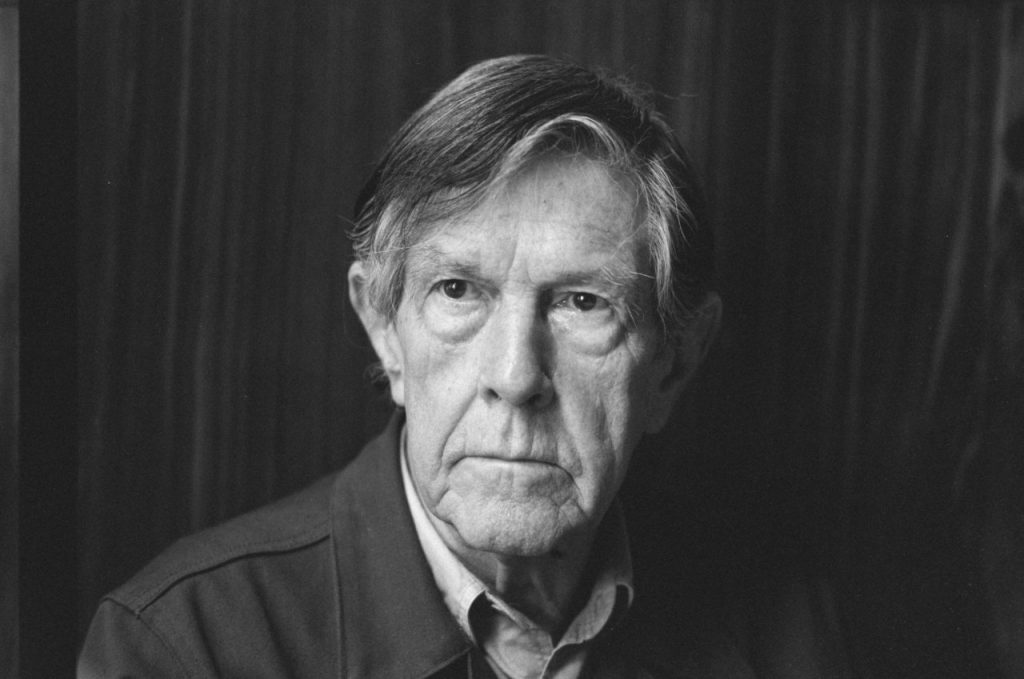
Image by or Rob Bogaerts/Fotocollectie Anefo
To properly honor your cultural role models, don’t try to do what they did, or even to think what they thought, but to think how they thought. This goes at least double for John Cage, the experimental composer whose innovative works can be, and often are, re-staged (go on, have four minutes and 33 seconds of silence to yourself), but it takes a different kind of effort altogether to cultivate the kind of mind that would come up with them in the first place. As a means of activating your own inner Cageness, you could do much worse than read through his personal library, a list of whose books you’ll find at johncage.org.
The volumes number 1126 in total, and if you load the library’s main page, it will present you with a list of ten randomly selected books. (You can get a list of all of them by selecting the “See Entire Library” option on the left sidebar.)
Hitting refresh a few times will give you a sense of the breadth of Cage’s reading: Emma Goldman on anarchism, Chinese poetry gathered by Kenneth Rexroth, M. Conrad Hyers’ Zen and the Comic Spirit (two of Cage’s driving forces if ever I’ve heard them), How to Play Backgammon, essays on Ulysses (an interest shared with Marilyn Monroe), and even essays on John Cage. Here we’ve assembled a list of ten books from Cage’s library of particular interest to the Open Culture reader:
- Fundamentals of Music Composition by Arnold Schoenberg
- Education Automation: Freeing the Scholar to Return to His Studies by R. Buckminster Fuller
-
Aveline Kushi’s Complete Guide to Macrobiotic Cooking by Aveline Kushi
-
A Skeleton Key to Finnegans Wake by Joseph Campbell and Henry Morton Robinson
- The Virginia Woolf Poems edited by Jackson Mac Low
- Alice in Wonderland & Through the Looking Glass by Lewis Carroll
- Philosophical Investigations by Ludwig Wittgenstein
- An Introduction to Metaphysics by Martin Heidegger
- The Narrow Road to the Deep North and Other Travel Sketches by Matsuo Basho
- The Poetics of Indeterminacy: Rimbaud to Cage by Marjorie Perloff
- Dubliners by James Joyce
- The Notebooks of Leonardo Da Vinci by Leonard Da Vinci
- The Order of Things: An Archaeology of the Human Sciences by Michel Foucault
To those who know anything of Cage’s life and interests, his shelves on healthy eating—on which Dining Naturally in Japan: A Restaurant Guide to Wholesome Food also appears, as, naturally given the era and Cage’s acquired northern-Californianness, The Tassajara Bread Book—and especially the eating of mushrooms, come as no surprise, nor might his inclination toward philosophy. But we should note what looks like a particular fascination with the work of Ludwig Wittgenstein, evidenced by 22 of the books in his library: his best-known works like the Tractatus Logico-Philosophicus, but also his letters, lectures, and notebooks, as well as biographies, commentaries, and Wittgenstein and Buddhism, which Cage must have considered an exciting find indeed.
In one of his most quotable quotes, Cage describes college as “two hundred people reading the same book. An obvious mistake. Two hundred people can read two hundred books.” And indeed, 1126 people can read 1126 books—or many more people can each read a different subset of those books. While you could methodically read your way through Cage’s entire library, and would surely learn a great deal in the process, wouldn’t making use of the unthinking guidance of the ten-random-books function, surrendering the direction of this informal education to the kind of chance that places Paul Bowles next to the common fungi of North American and Charles Ives next to Italian futurism, be a much more Cagean way of going about it?
(h/t @lrlarson)
Related Content:
The Music of Avant-Garde Composer John Cage Now Available in a Free Online Archive
John Cage Unbound: A New Digital Archive Presented by The New York Public Library
Jorge Luis Borges Selects 74 Books for Your Personal Library
The 430 Books in Marilyn Monroe’s Library: How Many Have You Read?
Darwin’s Personal Library Goes Digital: 330 Books Online
Based in Seoul, Colin Marshall writes and broadcasts on cities and culture. He’s at work on a book about Los Angeles, A Los Angeles Primer, the video series The City in Cinema, the crowdfunded journalism project Where Is the City of the Future?, and the Los Angeles Review of Books’ Korea Blog. Follow him on Twitter at @colinmarshall or on Facebook.


Sometime it isn’t the books in your library but the books that others share from theirs with you.
Today’s edition of Poetry Hour is dedicated to a friend who let us borrow a book of poems from him, they just so happened to be John Cage’s poetry.
Super interesting dude. Did you know that he wrote poetry?
When you wanna check out another poet’s take on mesostic poetry: thepoempros.com/2020/04/15/poetry-hour-episode‑3